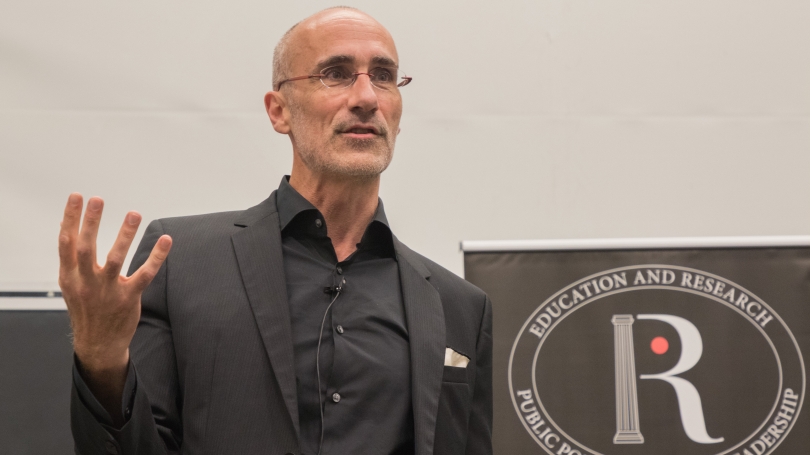
- Public Policy
- Leadership
- Funding
- News & Events
- About the Center
Back to Top Nav
Back to Top Nav
Back to Top Nav
Back to Top Nav
On Monday, September 23rd, 2019, former President of the American Enterprise Institute (AEI), Arthur Brooks, spoke at the Nelson A. Rockefeller Center, delivering a lecture on the nature of capitalism, specifically on whether it is a force for good or a system that encourages materialism and greed.
Brooks approached this question in two parts, focusing first on the good that capitalism has wrought for the world’s poor. Brooks praises capitalism for being the “most effective” means to alleviate extreme poverty throughout the world, pointing to large increases in American income and the reduction of starvation-level poverty by 80% in his lifetime.
Brooks has far more skepticism about the ability of the capitalist system to enhance the well-being of those who are already wealthy. According to Brooks, capitalism encourages a focus on “exogenous goals” – consumable items like cars and watches, which people believe will increase their well-being. The end result is a wasted life spent in pursuit of meaningless and materialistic goals. In Brooks’ estimation, our capitalist society has led to a corrosive culture of greed and materialism among the wealthy that is inimical to well-being. “Happier people have goals that revolve around relationships and love, and unhappier people have goals that revolve around ambition and fame and power and money,” Brooks says.
This raises the question: how can people cast off materialism and achieve happiness? According to Brooks, the solution is two-pronged: first, it is necessary to literally rid oneself of one’s deepest material desires (ideally substituting that with charity). Brooks calls on us to identify “the thing to which you’re most attached, the thing that’s enslaving you, and give it away.” Brooks’ second prescription is to prioritize “endogenous goals,” meaning those goals that pertain to love and relationships. In Brooks’ research on happiness, he’s found that spending quality time with friends and family creates much more lasting well-being than personal or material ambition.
Asked in the interview whether this philosophy had anything to do with his departure from AEI this past June, Brooks responded, “I left AEI because I had promised them I would be the leader for 10 years, and I had published a lot about how leaders, if they stay more than 10 years, tend to become sub-optimal.”
Probed about capitalism’s relationship to climate change and environmental degradation, Brooks emphasized the need for technological advancement, but also expressed optimism about the state of the environment. “Capitalism is the best thing that ever happened to the environment in the United States, because it reflects the changing set of ecological goals in the United States, whereas central planning doesn’t,” he said. Asked about whether our current environmental trajectory was sustainable, Brooks replied, “I don’t know,” saying that, while the scientific consensus is grim, scientists “can’t envision the technological advancements that have yet to come.”
On a final note, Brooks offered advice to young people heading out into the world. “Stand up to the man!” The man being “whoever it is on your political side who is trying to make you hate somebody else.”
Brooks leaves Dartmouth with these words, “Go on strike, refuse to hate, demand love, stand up to people on your own side who are suggesting hatred. That’s the most important moral strategy that I think people your age can employ.”
Written by Ben Vagle ’22, Rockefeller Center Student Program Assistant for Public Programs